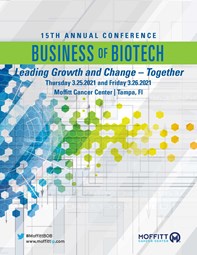Highlights From the 2021 Conference
 KEYNOTE ADDRESS - THURSDAY, MARCH 25TH
KEYNOTE ADDRESS - THURSDAY, MARCH 25TH
DR. PATRICK HWU
Moffitt Cancer Center president and CEO, shared his experiences during his first 100 days with the organization in his keynote address. He spoke about major strides the cancer center has made in the prevention and treatment of cancer and how he intends to bring his varied academic and clinical experience to help advance this work. Dr. Hwu also shared his vision to turn Tampa Bay into the cell therapy capital of the world, with Moffitt playing a central role in this biotech hub.
KEYNOTE ADDRESS - FRIDAY, MARCH 26TH
DR. JOHN CLEVELAND
Moffitt center director, spoke about his role overseeing the research side of the cancer center during his keynote address. He highlighted that during his time with the cancer center, he has hired some of the best and brightest scientists. He said Moffitt’s uniqueness lies in its data warehouse and innovative research programs, like Integrated Mathematical Oncology. Dr. Cleveland also highlighted the importance of Moffitt’s cell therapy efforts, and the team of investigators and clinical staff managing these trials and studies. He concluded with Moffitt’s focus on cancer prevention, addressing health disparities and cancer in under-represented communities.
BREAKOUT SESSIONS
Paving the Way: Partnerships Stimulate Novel Cell Therapies
This discussion centered on factors that influence the success of new technologies in cell therapies. Academic and industry collaborations are indispensable in the success of a new venture by providing support at all stages of the funding cycle ranging from proof-of-concept, preclinical IND-enabling studies, to first-in-human clinical trials. These alliances foster biotech hubs that provide entrepreneurial support for spin-out companies, which in turn attract VC investors and provide momentum to this economic growth.
Clinical Research: Advancing New Treatments Through Collaboration
The panelists of this session reviewed the future of targeted therapies in cancer and personalized medicine. Here, the field is advancing into individualized, bespoke treatments that target multiple neoantigens, and warrant multi-biomarker tests. Industry and academic partnerships are critical for identifying these novel biomarkers for cancer diagnosis, progression, and resistance to therapy; and have provided critical insight on how to practically apply these findings towards improved patient care.
Transitioning from Concept to Clinic: Conversations About Moving from Bench Asset to First Patient Dosing
This session examined how to leverage an experienced partner to ensure success of a therapy via a Target Product Profile (TPP). This tool should be developed early and must be an evergreen document, allowing companies to pivot in a constantly changing competitive landscape. Marketing is also a key factor, so companies must determine how their therapy improves survival, and ensure the data justifies these claims to the regulatory agencies, physicians, and payors.
Artificial Intelligence: Forging New Frontiers to Improve Healthcare Delivery and Management
Here our panelists discussed the state of artificially intelligence (AI) and how it will advance healthcare. AI is central to product development but is not intended to replace clinicians. Rather the goal is to unburden clinicians from repetitive tasks so that they may focus decision-making, keeping a ‘human in the loop’. This could increase efficiency and reduce costs. These products however must be designed with the patient-physician relationship in mind to ensure uptake in the clinic.

